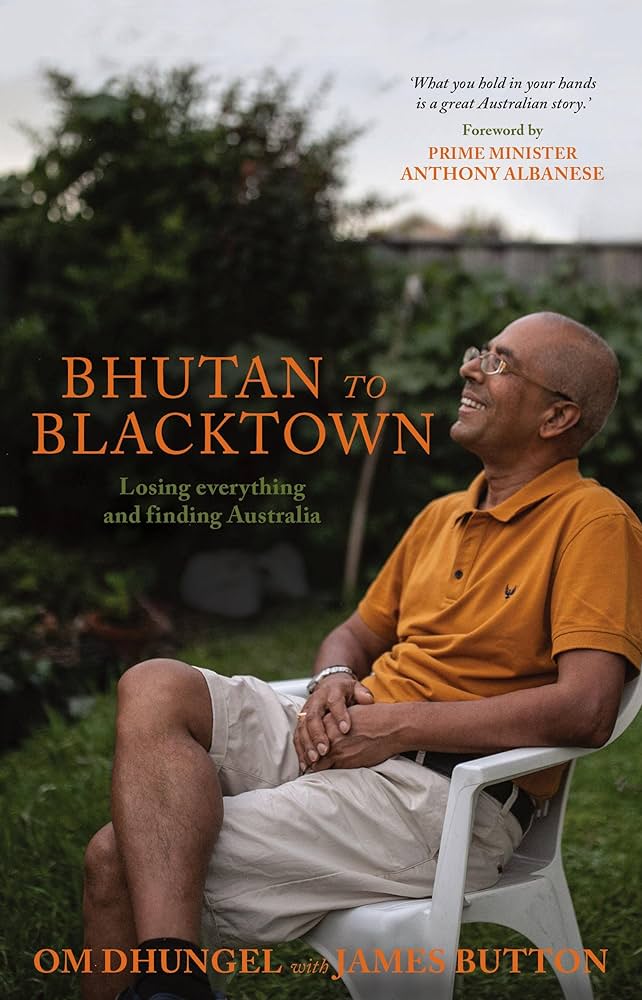Author: Om Dhungel with James Button[1]
Publisher: NewSouth
Reviewer: Bianca Stringer
Reading fiction or non-fiction books is much like the different windows on Play School. It gives us a glimpse into a world outside our own personal studio. Whether we look through the round, square, or arched window – we can visit unfamiliar places, meet interesting people, and we are given the opportunity learn.
Om Dhungel’s inspiring and remarkable story (as told to James Button) is one of hope, determination, and immense gratitude. In reading his story, we are taken through one of the windows and are introduced to Om’s boyhood life in Bhutan. A seemingly simple life, one where his parents were farmers and worked in the fields and Om attended a semi-formal school that was run by villagers with the curriculum consisting of learning the Nepali language and some religious studies.
But, from a young age, Om wanted more. He was hungry for the opportunity of education and, one morning, accompanied one of his brothers to the government school. After demonstrating his aptitude to the head teacher, Om began his education in upper kindergarten. Om seemingly understood that an education would provide a better future for him and so he continued his studies through until University and beyond, going on to holding senior positions within the civil service in Bhutan.
Om’s later education and young adulthood were marred by the ethnic cleansing that swept through Bhutan in the 1990’s. While I had a vague recollection that such atrocity had occurred in Bhutan, Om’s firsthand experiences allowed me to properly understand the persecution faced by the Lhotshampa people for years. This would have been an incredibly difficult and confusing time for the Lhotshampa as they truly saw themselves as Bhutanese, were loyal to king and country and had been for hundreds of years.
Over a seventh of the population from Bhutan were expulsed and it was ‘one of the greatest acts of ethnic cleansing, per capita, that the world [had] seen’. This was evidently difficult for Om given he held positions of power within the Bhutanese government and, for a period of time, was largely safe while his family and friends around him lived in fear. Om’s lived experience that he recounts for the reader gives us a glimpse of the life that was experienced by the Bhutanese at the time.
However, through all of this, Om remained determined to create a better life for himself and his family, including his beautiful wife, Saroja and his daughter. That first meant escaping Bhutan and becoming a refugee in Nepal – a dangerous task in itself. He describes in detail what life (and conditions) were like in refugee camps. Not being content with sitting back and accepting his “fate”, a true natural leader, Om, sought to make conditions in the refugee camps as humane and “normal” for others as possible, and to give the refugees a sense of purpose and focus for their time. Many refugees would seek Om’s counsel and it is obvious he was held in high regard.
Om was able, later, to migrate to Australia on a study visa, alone. It was an opportunity he did not squander and, unafraid of hard work, Om worked entry level jobs while he studied. In time and with perseverance, he landed a job with Telstra and was later able to migrate his wife, daughter, and extended family to Australia.
What struck me about Om’s story was his immense gratitude for the new life he was afforded in Australia. Instead of lamenting on all that he had been through, he once again picked himself up and continued to create a better life for himself, his family, and others. Om became especially focused on the refugee community within Australia and his local area.
Having firsthand experiences with the difficulties assimilating to Australia but appreciating the cultural differences of the Bhutanese and Nepalese people, Om was instrumental in working with non-government organisations to help the newly migrated. Om found ways to help others feel like they belonged. He created a sense of community. He created pathways – for those who arrived uneducated and illiterate – to learn and improve their English which in time would assist them to further their work opportunities. In time, he and his wife, along with four other couples, founded the Association of Bhutanese (‘ABA’) in Australia. He was ‘determined to ensure the Bhutanese got a good foundation that was not just material, but cultural, moral, even spiritual.’ As he tells it, in his story, he ‘felt in debt to the newcomers’ and recognised the importance of developing a sense of belonging. Om did not just want his people to survive in Australia, but to thrive, and it is evident that Om achieved that and more.
Written at the start of the COVID-19 pandemic in Australia, Om’s story continues and ends with the ways in which he continued to support his local community – not only the Bhutanese, but those within his local residential estate. He is the epitome of community spirit and being of service to others.
I was uplifted and inspired in reading Om’s story. It reminded me that I have a lot to be grateful for and of the sense of purpose that comes from serving others. A powerful and moving story (and it certainly is when the Australian Prime Minister is willing to write the foreword), it is one of sacrifice and hope. Om gently reminds us that we get one life, that it does us no good to outsource our happiness to others, and that it is up to us to make the most out of life.
I highly recommend Om’s story to all.
[1] James Button has won two Walkley Awards for feature article journalism and two other books of his have been published by MUP. Speechless is a personal memoir which reflects upon his relationship with Button’s father, John Button, a senior minister in the Hawke and Keating governments.



